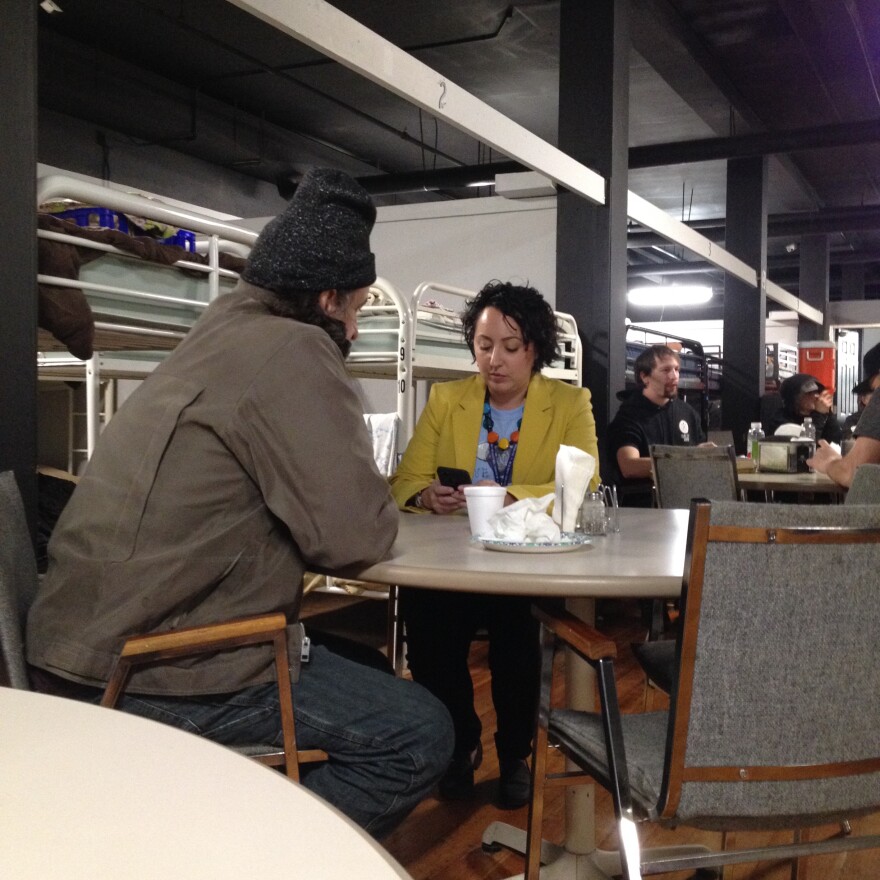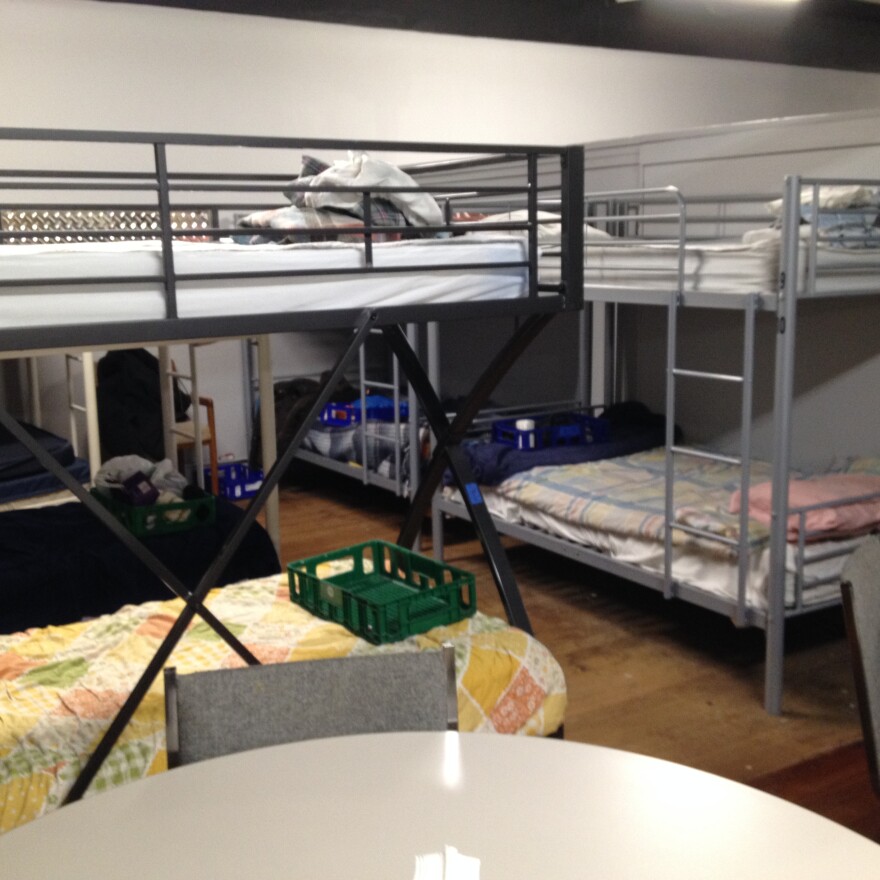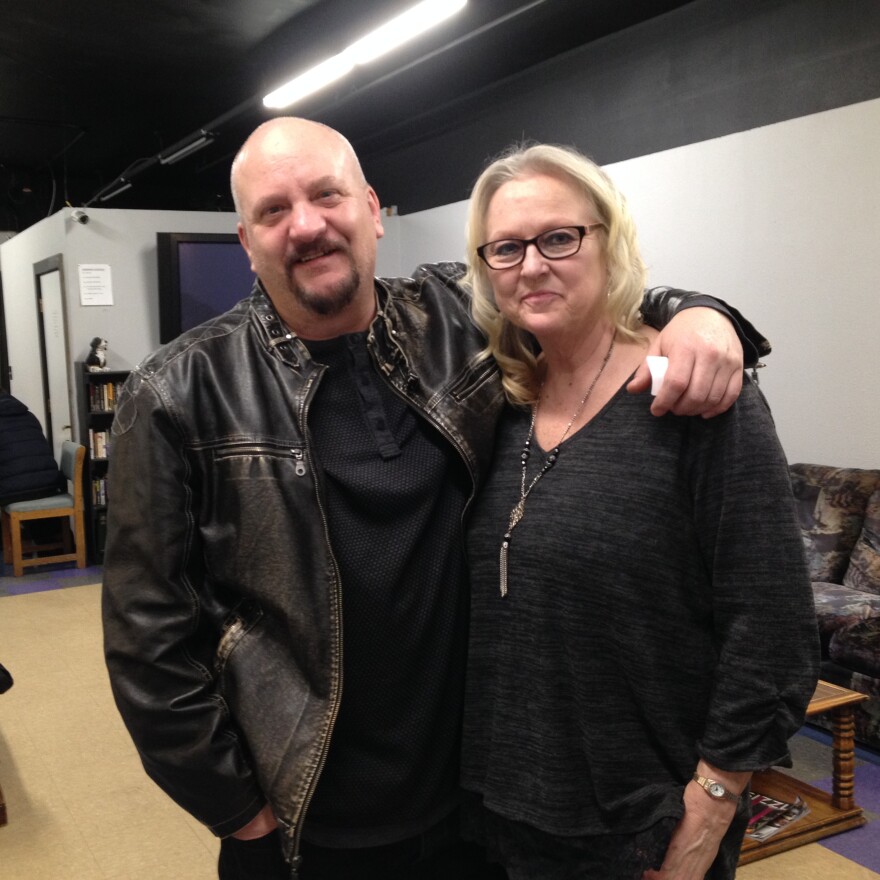Two weeks ago I was out covering the beginning of Spokane’s annual Point-in-Time count of the homeless population. I went to the Truth Ministries facility in east Spokane. It’s a place where men can congregate at night, eat dinner, conk out on a bunk bed, then get up early and head out to start another day.
“We’re not really a homeless shelter. We want to get out there that we’re not enabling these guys by just giving them a bed. We are actually helping them to get back on their feet,” said Chris Turner, the lead volunteer on the front desk. Turner bounced back and forth between this place and the Union Gospel Mission after he was released from jail a few years ago. He went through the mission’s life recovery program, but eventually found his way back here.
“I was living with roommates that were not going the same direction as me, I guess. I needed to get away, so I came back here because I remembered and Marty asked me to volunteer. One thing turned to another and now, it’s about two years later now, and I’m doing a lot now. I’m learning how to write grants and pretty much running this place now with the help of Marty,” Turner said.

On this night, there are about two or three dozen guys here. One or two are reading in their bunks. Others are sitting around tables talking.
Chris Turner: “We have a lot of guys that work. We have a lot of guys that are on SSI or SSDI. They are awaiting housing. We do charge two dollars a night to stay here. If you have an income, there’s a sliding scale of up to five dollars a night. So, with no income, it’s two dollars a night.”
Doug: “Are there rules for staying here?”
Chris Turner: “There are definitely rules for staying here. We do not UA.”
That’s urinalysis.
Chris Turner: “Or drug test. But if you are under the influence and it’s obvious, if you’re a guest here and you come in drunk or high or something like that, we will try to get you to bed. If you start causing problems, you will have to go somewhere else.”
Doug: “Do you have a lot of regulars here?”
Chris Turner: “We do have a lot of regulars and that’s basically how this place is run. You have to stay here every night. If you do leave, for whatever reason, you have to wait a week to check back in. So we encourage the consecutive stays so we don’t do the ins and outs. We keep a data base of everybody that’s been here, so we have notes on their histories. If a guy caused problems in the past, we have it on a note. We really screen who comes in here now. If a new guy has never been here, we start a file for him, take their picture and just keep notes on him.”
Firearms are not allowed here. If someone brings one, it’s locked up. The men have their backpacks and other belongings stashed away too. They can only bring in toiletries and pajamas. At seven the next morning, there’s a wakeup call and off they go by eight.
“It’s not stressful. It’s safe. It’s a family atmosphere. We call it a brotherhood,” Turner said.
He enjoys working here. He finds it to be a calling of sorts.
“It’s just when you help somebody and you’re in that process of helping them change their life and you see that happening, I can’t describe the feeling I get. But I found out that I have a heart for that," he said.
A few minutes ago, Turner referred to Marty. That’s Marty McKinney. He and his wife Julie founded the place. They own it and run it. They oversee a small staff and group of volunteers who provide basic services to their clients.
McKinney takes me back into his office. It’s a cozy little room with electric guitars hanging from the walls.
Marty McKinney: “If we need to talk to somebody, maybe a guy loses a family member. He’s hurting. ‘It’s ok, buddy. Do you want to talk?’ Or maybe I need to tune somebody up. ‘You do that again and it’s cold outside. I don’t care. You ain’t doing it again.’ Understand? Man-to-man. I always have a witness so they can’t say I beat them up in here. It’s a room to meet with people. But as far as the stuff, there’s kind of some remnants in here because I’ve been a musician all my life. And I had a little recording studio in here. It was a place that I would come and write and record music. I still play; I play at The Knitting Factory quite a bit. So it was a recording studio, but this is not the place for it.”
Julie McKinney joins us. We talked about Truth Ministries’ place in Spokane’s community of shelters and warming centers. We talked about the recent protest outside City Hall by homeless people who shared their concerns about shelters like Truth Ministries and the Union Gospel Mission. We started by asking Marty McKinney to tell us about his organization.

Marty McKinney: “Between 8 pm and 8 am, during the warm months, we’re pretty structured. We want the people that come to stay with us — everybody’s invited — but they need to make some decisions to become unhomeless, whatever it takes, whether it’s getting a job, going to school, pursuing SSI or maybe they’ve got some health issues they’ve got to take care of. Maybe there’s mental health issues. We have caseworkers that come in on every single one of those issues to help us handle whatever those issues are. The ones that are not ready to quit whatever substance abuse may be, that’s what it boils down to, the people who get kicked out of here. Their behavior won’t be good because some of their issues. But we’ve always taken people back that come back and owned their stuff and said ‘I’m sorry. I shouldn’t have acted like that. Forgive me.’ Come on in. We’ll do it again. Try it again. Don’t do it again. And usually, nine times out of 10 they don’t do it again. Those are usually pretty tough things that they get kicked out for. It’s not little stuff. During the warm months, we often concentrate on those groups of people. During the winter months, we explain to those people that are being instructed — they like the peaceful house and everything. Guess what? Now, guys, get ready because it’s winter time. We’re going to relax the rules a little bit and we’re going to let the people come in that have been kicked out of here. We’ve always done that. We’ve been here for 16 years and we’ve always done it. We’ve had 85 people in here in one night. There’s really not been anybody that has been kicked out of here, except for maybe two, that I would have to figure out how are we going to deal with this person because it’s below zero and this person was very violent. But we’ll figure out how to deal with it. We don’t turn people away. That’s one of the things that kind of was insinuated by the protests. It was kind of insinuated that we were too religious, we didn’t have enough beds. Through that whole protest we had 15 beds and nobody on the couches. We didn’t have to bus out any rollaways. Last year, all winter long, the couches were full and we had three or four rollaways that were usually full. We were always full in here and we have 54 beds. That was like that for 15 years. This year it’s different. Why? I think there’s a lot of things to it that none of us know because it seems to happen every three or four years. A couple of individuals are always involved in the protests every three or four years and it’s always the same thing. The city doesn’t give enough. The city doesn’t do enough.”
Doug: “What do you think about that?”
Marty McKinney: “I think it’s untrue. I think the city does a lot. I think now there seems to be more issues at the moment for this group of people that, maybe they’re not ready to commit to changing things so they can’t stay in the structured environments. They’re kicked out of them, right? So, I get it, there needs to be someplace for them to be. I think there’s some conversations that need to take place between us and UGM and House of Charity and the city and different people and everybody put their hearts and their minds together and say, ‘Can we come up with a plan for next year that’s going to be safe for the people that are running it? We see the problems with that too. I think it’s way bigger than any of us really have an answer for. I’m very familiar with the clientele. The first three years that we were open, that’s all that I dealt with was the hardest of the hard. Now we’re just a transitional place that we want them to transition and be unhomeless. And it works. It’s been working. Our neighborhood’s clean. I think our neighbors are all happy with us. We’re blessed.”
I asked McKinney where Truth Ministries fit among the city’s shelters. There’s the Union Gospel Mission, with its insistence that its clients stay sober while staying there, on one end, and the House of Charity, which will care for anyone, on the other.
“Kind of in the middle,” he said.
He explains that he doesn’t know the folks running the House of Charity now, but he’s friends with Phil and Randy Altmeyer and their family members and associates who run Union Gospel Mission.
Marty McKinney: “The Altmeyers are my friends, my elders, my brothers. They’ve helped us out over the years, big time. The Mission, a man comes in, he’s homeless, so he stays there and he’s got a certain amount of time to decide to go through their program. If you don’t want to go through the program, then they have to choose to do something else. Some people who are homeless are ready to work right now. They don’t want to go through a program. Maybe they’re raised differently. They don’t believe some of the things. House of Charity, they take care of the addicted, everything. They do hard, hard work. They deal with the people that aren’t ready to quit, the people that are very hard to deal with when you get a bunch of them together. We are kind of in the middle where we believe in structure and people have got to be responsible for their lives. But we also believe that the Mission’s already doing that and they’re doing very well with it. That’s just not me. We are here for people that maybe aren’t ready for that kind of a program. Maybe they were raised differently in their beliefs. But they’re ready to work at whatever it is to become unhomeless, whether it’s work, school or SSI or whatever it is. We’re in the middle. They don’t have to go through a program here. They don’t have to do any religious activities here. I think that’s good for some people. Those guys who fell between the cracks and they don’t want to be around chaos, they want a peaceful house when get off work, where they can come in and get something to eat, take a shower, go to bed, get a wakeup call and get a cup of coffee and go to work and do it again.”
McKinney says many of the men who live at Truth Ministries are employed, but for some reason, aren’t ready to live on their own. Others use this as a stepping stone.
Marty McKinney: “We’ve got one kid that I’m really proud of because when he first started coming, I thought he’s not going to last. But he has. What he did on his own was, as he was staying with us, he put himself through college. He got the grant and what he needed to do, went to college and learned how to weld and then he went and applied at one of the big places and he’s an apprentice now as a welder. So in a year after his apprenticeship, he’ll make good money. He’ll be on his feet. He’s done great with his life. That’s just one story. There are all different stories. It takes a process of time for each and every individual. It’s all different for them.”
Julie McKinney has been sitting and listening. I turn to her and ask why she’s involved with Truth Ministries.
Julie McKinney: “Service is my life. It helps me with all of my problems. I’ve suffered with depression. I’ve suffered with all kinds of things and it makes every one of those things go away. When you serve others, your problems are small in comparison. I love to serve others and these guys have become a family to us. There are a few of them, they are people I know don’t function well any other place. They’ve tried. They’ve gotten other apartments and maybe they’ve been drug-infested or not good neighborhoods and we just want to provide that safe place for them here. That is our vision. We’ve always had that vision to have some housing for them up above or wherever. I don’t know if it’s another building or…I’ve always thought it was up above like the Hope House.”
Doug: “Do you have a second floor now?”
Julie McKinney: “We don’t, but when we moved in here, Al French, he was our architect back then when we moved in in 2005, I had a dream one night of apartments up above. I said ‘Al, is it possible for us to build up?’ He didn’t say anything. He came back the next day and said, ‘Julie, I checked into it. It’s possible,’ and walked out. So I know it’s possible and that’s what we’ve been focusing on lately.”
Marty McKinney: “We’re seeking an architect and so we’ve got our fishing pole in the water to see what’s going to come up there and come up with some plans and say, ‘ok, which one’s going to work for us?’ We’ve got to find out what the city will allow here. Then we’ve got some people with us on our board and some other people that serve here and help us. We get minds together and say how do we present this to people who want to give for this sort of thing? Are there agencies that are already working with low-income housing that need more space that can help us get it done? And then we’ll work out the details. It’s not only possible, it’s going to happen.”
In a way, the McKinneys are in a similar place as when they moved to this building in the 1900 block of East Sprague. Back then, it was a place with no occupant.
Marty McKinney: “We were getting kicked out of a place and we saw this building and I called the fire marshal, and he knew who I was, and I asked him what it would take to get a homeless shelter down here. It was 13 years ago. And he says you’ll never be able to do it, Marty. I told him, ‘would you please just tell me what I need to do, not what I can’t do.’ He said, ‘ok, you need a sprinkler system, you need an alarm system.’ That was early spring. Christmas Eve we moved in. All the sprinkler heads here, the unions and everything else got together. They put the sprinkler system in. All the fire alarm people, any of them you can name, they were all here. They did the sprinkler system in one day. I watched them do it. God bless them. They did a lot of work in one day.”
McKinney says Truth Ministries has come a long way since those days. Back out in the main room, Chris Turner says the organization is in the middle of a transition.
“The first 12 or so years, Truth Ministries was going, it was a homeless shelter," Turner said. "The last couple of years we’ve really been focusing on helping these men transition back into the community, get them jobs, get them housing, whatever it may be.”
If all goes according to plans, that transition will include low-income housing in a city that desperately needs more of that.

